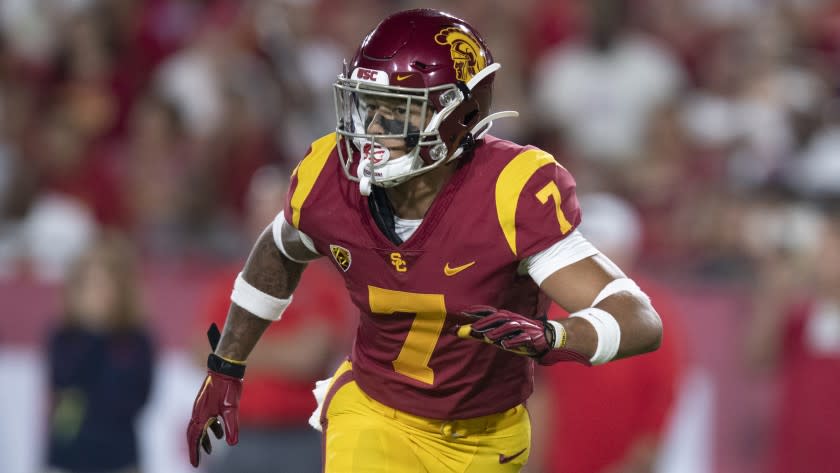USC's Chase Williams says he's willing to boycott season if safety measures aren't met

The lone USC player to lend his name to a group of Pac-12 football players demanding change affirmed Wednesday he would be willing to join a boycott of the college football season if measures weren’t taken to strengthen safety protections for players.
But where some Pac-12 participants have taken a more hard-line stance on demands that also include wide-reaching social justice and economic reforms, Chase Williams explained his role in the cause was “more so [about] just pushing for a change, so that we can get back to football.”
Williams said he has had discussions with USC teammates about sitting out if the group’s safety concerns aren’t addressed. But the redshirt sophomore defensive back noted several times that they were “not expecting to boycott.”
“That’s not what anybody wants,” Williams said. “We want to come together and list demands that we feel like are safe for us.”
Williams was not among the 13 Pac-12 players listed in the original demand letter released Sunday. But he took up the role of team representative just hours later, as more and more USC players began seeking information about the group. Later that night, Williams was listed alongside other leaders of the cause in a letter sent to Pac-12 Commissioner Larry Scott.
He wanted to “stand up for what’s right,” Williams said, when asked why he lent his name to the cause. “I believe in speaking up.”
He has since shared his concerns with coach Clay Helton, whom Williams said addressed the issues openly with the team during a meeting. Williams said his concerns aren't with USC, which he believes has taken "a good approach" to safety, but with what comes after contact practice begins.
Several USC players have offered their support for the movement, posting #WeAreUnited on various social media platforms. But several others also balked at the looming prospect of a boycott.
“I came to USC to play football and make it out for me and mine… idk what they on,” sophomore cornerback Chris Steele wrote on Twitter.
Williams is the only Trojan thus far to discuss the cause offline. Still, on Wednesday, he was hesitant to position himself as the leader of the cause on USC’s campus.
“I’m not saying I’m fighting any harder than anyone else on my team,” Williams said. “We’re all in the same position. We’re all in this together.”
That collective cause grew ever more significant Wednesday as a group of Big Ten players followed the Pac-12 in pushing for improved safety protections against COVID-19. The list of demands presented to the Big Ten included many of the same points as it pertained to pandemic-related safety — such as increased testing, extended health care and additional eligibility — but contained no threats of a boycott.
The Pac-12 players took their demands a few steps further, tackling issues of racial injustice and suggesting a substantial pay cut for the conference’s leaders and coaches. They also called for an equal distribution of 50% of the conference’s annual revenue among all players.
Williams supports the group’s wide-reaching platform, but said that safety was his primary concern.
“The exact demands that need to be met right now are the health and safety protocols,” Williams said. “So that’s why I feel like players in the Big Ten came out with their demands leaning towards that. We’re all supporting each other in this fight.”
The Pac-12 group declared its first victory Wednesday, as the NCAA Board of Directors announced that it would grant three of the players’ original demands. The NCAA guaranteed that all athletes who opt out due to COVID-19 would keep their scholarship. It also did away with liability waivers and put the responsibility of COVID-related medical expenses on schools.
“When we as players are united, our voices will be heard,” Washington State defensive lineman Dallas Hobbs said in a statement. “These are important victories but players still don’t have any uniform, enforceable COVID standards to keep players safe.”
A group of those players met with officials from the California governor’s office Tuesday to discuss that topic. They requested an executive order to mandate third-party oversight of COVID-19 protections and ensure players' eligibility for an additional season.
With less than two weeks remaining until Pac-12 training camps will be allowed to open, Williams is still hopeful they won’t need to boycott.
“Obviously, it’s a negotiating process,” Williams said. “Maybe not all demands will be met immediately, but will be thought about and maybe put into action later on.
“But I don’t feel like right now, with everything the way it is, before any change or action has been made, I don’t feel like it’s safe enough to play football.”

